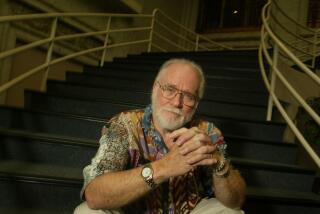Albert Marre dies at 87; director of ‘Man of La Mancha’
The teleplay “I, Don Quixote” captured the attention of theater director Albert Marre in 1959, but not for its intense drama. He “saw it as a musical.”
By 1963, Marre was meeting in Palm Springs with the teleplay’s author, Dale Wasserman, to sketch out the framework of “Man of La Mancha,” which Wasserman wrote. After opening on Broadway in 1965, the musical was phenomenally successful. It received five Tony Awards, including one for Marre’s direction.
Marre, 87, died Sept. 4 in New York City, his family announced. No other details were given.
He directed several Broadway revivals of “Man of La Mancha” and many other versions of the musical across the country, including a Los Angeles production that opened the newly built Ahmanson Theatre in 1967.
The musical is set in a 16th century jail and features Spanish novelist Miguel de Cervantes, who entertains fellow prisoners by acting out the story of his most famous literary character, Don Quixote.
“‘Man of La Mancha’ is really pretty simple,” Marre told the Seattle Post-Intelligencer in 1995. “Not a big cast. No fantastic scenic effects. The prison. The prisoners. No transitions. The audience has to use its imagination.”
Marre said he attempted to cast such names as Laurence Olivier and Michael Redgrave in the lead role; but the part eventually went to Richard Kiley, who was in the company of actors at Goodspeed Opera House in Connecticut, where “La Mancha” began.
“The show’s simple storytelling and idealistic, yet charmingly foolish hero struck a chord with audiences, rendering the show an oft-revived classic,” according to the Broadway Theater League. The play’s central song, popularly known as “The Impossible Dream,” became an anthem of musical theater.
In the original “Man of La Mancha,” Marre cast his wife, Joan Diener, as the serving wench Aldonza. Diener had blond-bombshell looks and “a 3 1/2 octave range,” the musical’s composer, Mitch Leigh, told the London Independent in 2006. “We tailored the music to her voice.”
The director had previously worked with Diener on his other major commercial Broadway success, the Tony Award-winning musical “Kismet,” which opened in 1953. They raised two children and were married until her death at 76 in 2006.
Every month, Marre received royalties for performances of “Man of La Mancha” in places as varied as Ecuador, Poland and Latvia, he said in the Post-Intelligencer in 1995: “I mean little checks, $20 or so. But it reminds you how popular this show is.”
The play has been translated into at least 22 languages and performed in more than 45 countries.
He was born Albert Moshinski on Sept. 20, 1924, in New York City and earned a bachelor’s degree from Ohio’s Oberlin College. While serving in the Navy, he directed the American Repertory Theater in postwar Berlin.
As a law student at Harvard University, Marre joined a drama group with his first wife, actress Jan Farrand, whom he later divorced. In 1948, the group founded the Brattle Theater, a highly regarded classical repertory company in Cambridge, Mass. Marre was soon directing the first of more than 25 Broadway productions.
Of the hold “La Mancha” had on his career, Marre told The Times in 1999: “When this large a hit happens and it gets done worldwide, it takes a block of time in your life. That’s fine, but then you don’t do anything else.”
Marre is survived by his third wife, actress-lyricist Mimi Turque; his children, Jennifer and Adam; and three grandchildren.
More to Read
Start your day right
Sign up for Essential California for the L.A. Times biggest news, features and recommendations in your inbox six days a week.
You may occasionally receive promotional content from the Los Angeles Times.







